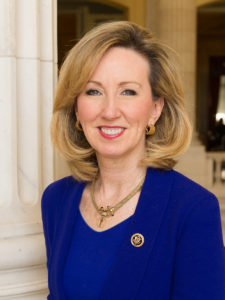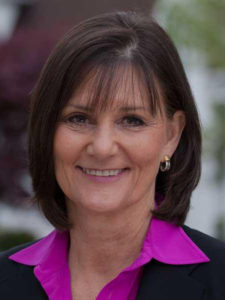
In the race to represent Virginia’s Tenth District in the United States House of Representatives, incumbent Representative Barbara Comstock (R-VA 10th) is seeking reelection and is challenged by LuAnn Bennett (D).
The Tenth District encompasses Clarke County, Frederick County, Loudoun County, the cities of Manassas and Winchester, and parts of Fairfax and Prince William counties. Comstock was first elected in 2014 and is nearing the end of her first term.
All seats in the House of Representatives are up for election every two years. There are 435 seats, representing each of the fifty states in rough proportion to their population as recorded in the most recent national census. There are an additional six non-voting delegate seats representing U.S. territories and the District of Columbia.
The Republican Party currently holds a 247-186 majority over the Democratic Party in the House, and two seats are vacant. Virginia has eleven seats in the House, with eight held by Republicans and three held by Democrats.
Incumbent: Barbara Comstock (R)

Incumbent Representative Barbara Comstock (R-VA 10th) is nearing the end of her first term representing Virginia’s tenth district in the United States House of Representatives, and is seeking reelection.
Before her election to the House, Comstock was a long-time Republican Party operative. After earning her law degree from Georgetown University, she worked for a time as a lawyer in private practice. She became a senior aide to Representative Frank Wolf (R-VA 10th) in 1991, and served in that role until 1995. She then moved on to serve as counsel on the House Committee on Government Reform from 1995 to 1999.
Comstock worked for then-Governor George W. Bush’s (R-TX) 2000 presidential campaign, leading a research team that collected information about then-Vice President Al Gore (D), who was running against Bush. After the election, she crafted defenses of President Bush’s more controversial political appointees.
From 2002 to 2003, she served as director of public affairs at the U.S. Department of Justice, after which she reentered private practice. Comstock served on the defense team for I. Lewis Libby and Representative Tom DeLay (R-TX 22nd) and lobbied on behalf of the Motion Picture Association of America (MPAA).
In 2009, she was elected to the Virginia House of Delegates representing the Thirty-Fourth District, which encompasses much of northern Fairfax County and the northeastern corner of Loudoun County. She served there until her election to the House of Representatives in 2014. She also served as a consultant to former Governor Mitt Romney’s (R-MA) presidential campaign in 2012.
Comstock is generally considered to be a moderate, and is a member of the Republican Party’s ‘machine’ or ‘establishment.’ She has been criticized by some hard-right Republicans and members of the ‘Tea Party’ movement who believe that she is insufficiently conservative. She has also been criticized by some grassroots Republicans for refusing to support the party’s presidential nominee, Donald Trump (R). She was one of numerous establishment Republicans who sat-out this year’s Republican National Convention in protest of the then-presumptive nominee.
For her part, Comstock brands herself as a ‘common sense conservative.’ On the key issues, she takes positions in-line with what would be expected from a mainstream member of the Republican Party. In Congress, she has fought for tax relief, supported important transportation bills, supported defense funding, and worked to pass human trafficking legislation.
If reelected, Comstock promises to fight against national security cuts, provide more funding for transportation infrastructure, champion small businesses, fight for our veterans, increase pay and stability for federal employees, secure our borders, improve drug policy, and improve education policy.
Comstock is, in general, a strong defender of human rights and civil liberties. She acknowledges and supports the right to life, the freedom of speech, the freedom of religion, and the right to keep and bear arms. She has voted consistently with these principles both in the House of Delegates and, now, in the House of Representatives. However, she has been much less consistently in favor of Fourth Amendment protections against unreasonable search and seizure.
As a machine Republican, she has been tepid-at-best on reining in federal authority and balancing the federal budget. Comstock generally votes the party line on these issues, whether the party line is right or wrong.
In her campaign, she makes many promises for increasing or protecting federal funding (especially for defense and transportation), but is silent about how our deeply-indebted government might fund those efforts. She appears to offer no strategy for balancing the budget, reducing the debt, or restoring a proper separation of powers between the federal and state governments.
Challenger: LuAnn Bennett (D)

Local businesswoman LuAnn Bennett (D) stands as the Democratic Party nominee to represent Virginia’s tenth district in the United States House of Representatives, challenging incumbent Representative Barbara Comstock (R-VA 10th).
Bennett and her husband Rick started a local asset and real estate management firm in 1980, shortly after the couple moved to Fairfax County. The business grew under their joint leadership and became quite successful. After Rick was stricken with leukemia and passed away in 1994, LuAnn took sole control of the company. RAB Management, later renamed to the Bennett Group, continues to operate under Bennett’s leadership today.
From 2004 to 2010, Bennett was married to Representative Jim Moran (D-VA 8th). Moran retired from Congress when his twelfth term concluded in early 2015.
In addition to her business endeavors, Bennett has also served on a number of boards and commissions. She currently serves on the boards of the Virginia Health Care Foundation, the Charity Works Advisory Board, and the board of the National Children’s Museum. She also served as an appointee on the Virginia Climate Change Commission under then-Governor Tim Kaine (D-VA). This campaign is her first attempt at seeking elective office.
If elected, Bennett promises to improve education policy, combat the rising cost of college education, invest in our roads and bridges, support “smart development,” eliminate unnecessary regulation, support the public workforce, fight the Islamic State, and support paid family leave.
When it comes to the most important issues that will face Congress in the coming years, Bennett is largely silent (as, for that matter, is Comstock) . . . but in Bennett’s case, we cannot refer to a voting record to fill in the gaps.
Bennett expresses no support for human rights and civil liberties; on the contrary, she denies the right to life (cynically referring to abortion as a “healthcare decision”), and supports new and unnecessary restrictions on the right to keep and bear arms. She is silent on the freedom of speech, freedom of religion, and protections against unreasonable search and seizure, but is a member of a party that is now largely hostile to these rights.
As a Democrat, Bennett is unlikely to advance any effort to rein in federal authority or balance the federal budget. Like Comstock, she makes a number of promises in her campaign, but offers no plan for how our deeply-indebted government would fund them. Investments in transportation, defense spending, and education spending sound lovely, but the money for those efforts must come from somewhere.
Bennett also offers no strategy for balancing the budget, reducing the debt, or restoring a proper separation of powers between the federal and state governments. She is unlikely to support these efforts even in principle, as they are generally opposed by her party.
Conclusion
The most important issues facing Congress in the coming years are: 1. Reversing the rapid erosion of our human rights and civil liberties; 2. Reducing the scope and breadth of federal authority; and 3. Balancing the federal budget.
Both Comstock and Bennett offer little, if anything, on the latter two of these issues. Both propose continuing with irresponsible levels of federal spending. Neither proposes balancing the federal budget. Neither proposes limiting the scope of federal authority. Neither proposes reasserting the proper separation of powers between the federal and state governments.
As a general rule, it is safe to assume that a Republican candidate will be better than a Democratic one in these areas, but that is not a guarantee. And ‘better than the alternative’ does not mean ‘good.’ In recent years, it seems like Democrats want to bankrupt the country in five years, and Republicans would rather do it in ten. I’d rather not bankrupt the country at all . . . but if those are our choices, I guess I’ll tend to support the side that wants to do it more slowly.
If the scope and breadth of federal authority and balancing the federal budget were the only concerns in this race, we would have no good choices available to us. This would be a prime example of a race where we would have to reluctantly vote for whomever we think is the lesser of the two evils.
But it is also critically important that we begin to reverse the rapid erosion of our human rights and civil liberties, and in this area, the choice is clear. Comstock has a strong record of supporting human rights. Bennett, however, is either silent or disastrously wrong about them.
Although Comstock could do much better on search and seizure, she is vocally and consistently in favor of the right to life, freedom of speech, freedom of religion, and the right to keep and bear arms. Bennett is not. These rights are not negotiable. And so I endorse the reelection of Representative Barbara Comstock (R-VA 10th) to represent Virginia’s tenth district in the U.S. House of Representatives.

